In choosing to offer Keffiyeh: Made in China, Mosaic Theater has gifted us just that — a mosaic of short and trenchant pinhole theatrical views into the everyday tensions, fears, and losses experienced by the Palestinian people. While we all hope to return full-time to theaters worldwide, Mosaic’s successful online effort reminds us that we don’t have to sacrifice connectedness and artistic excellence even in these challenging times.
—Amy Kotkin, whose reviews of all seven episodes are below in chronological order

“Theater,” writes Palestinian playwright Dalia Taha, “is a celebration of fragility, transience, imperfection, collapse, precariousness, unreliability, and collision.” Her 2012 play Keffiyeh/Made in China explores all of these dynamics in a series of short dramatic vignettes that streamed individually as a virtual production by the Mosaic Theater Company. A total of seven short episodes were released on alternate Tuesdays beginning May 11, 2021. Each explored the effects of the ongoing tension and violence experienced by Palestinian people under occupation.
“Being a Palestinian,” says Taha, “doesn’t mean I am part of just this struggle; I see myself as someone who is part of everyone’s struggle.” The occupation of Palestinian lands — and the concept of occupation worldwide — finds vivid expression in each segment of Taha’s provocative play.
Keffiyeh: Made in China, originally distributed as seven short, individual episodes, has been re-released as a single 75-minute virtual production. This video on demand offering is available for purchase and viewing via Mosaic’s website through October 31, 2021. As part of Mosaic’s commitment to providing greater accessibility, this video is also available at no cost by using code: KEFFIYEHZERO during the check-out process.
Episode 1: “60 Seconds”
Released May 11, 2021
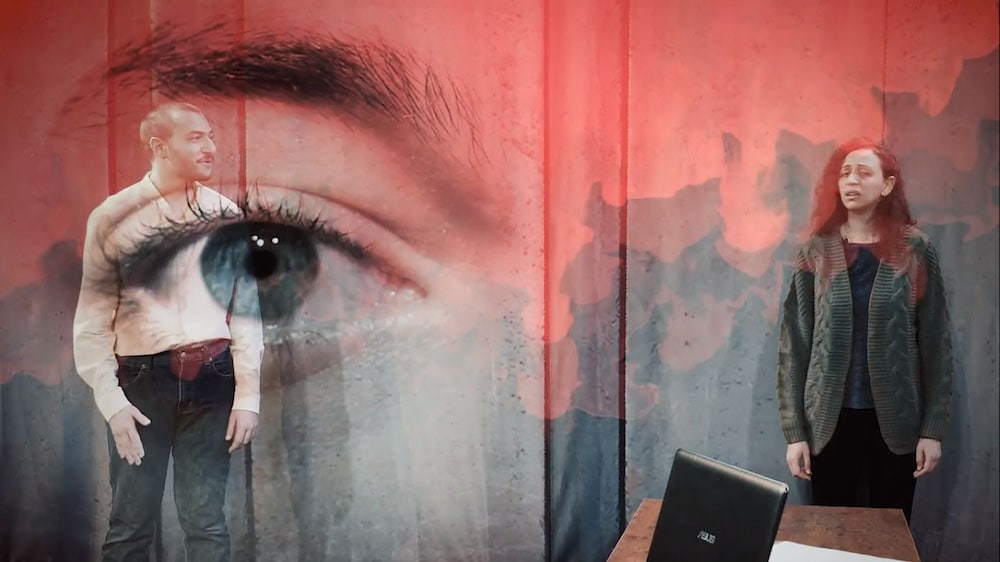
Taha challenges the nature of time, space, fact, and fiction in the intriguing first installation of Keffiyeh/Made in China, well-directed by Adam Kassim. We are ushered through double doors to a darkened, off-limits space. A laptop sits on an otherwise empty table — standing ready to create, record, and play back another story of tragic violence. Two unnamed characters, a man and a woman (Fargo Tbakhi and Dina Soltan), recount the last 60 seconds of the man’s life — just before a bullet ripped through his eye, splattering it on the lens of a journalist’s camera. His grievous wounding is recorded and played over and over on YouTube, forcing the characters to consider the before, during, and after of yet another horrid danger faced by occupied peoples. Taha adds yet another layer to the play as the characters adroitly step in and out of the drama, wondering about the playwright’s intentions in crafting this brief and thoroughly engrossing tale, and why she has chosen their story to tell. We don’t yet know how Taha selected the overall title of the play. Perhaps that will be revealed in future episodes. Stay tuned!
Running time: Approximately 10 minutes
Episode 2: “Craving Mangoes”
Released May 25, 2021
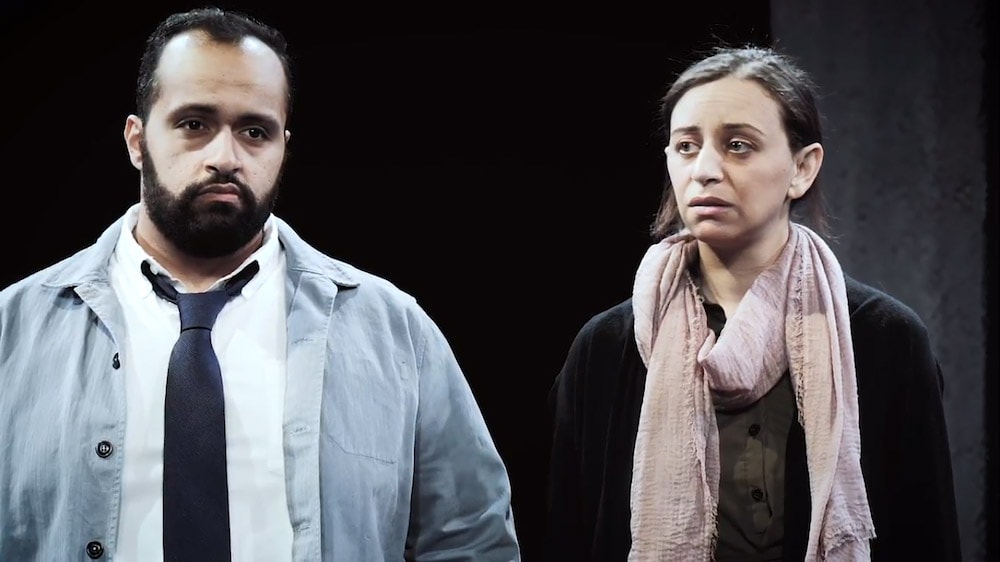
In “Craving Mangoes,” the second episode of Keffiyeh: Made in China, Dalia Taha ushers us into a parent’s worst nightmare — identifying a son at the local morgue. A nameless Palestinian couple sits outside the vault, unable to step inside. As long as they delay, there is still hope. The mangled corpse, now missing an arm, could have been someone else. In a staccato, 12-minute dialogue between husband and wife, Taha deftly sketches the sadness, hope, and poignancy of what was likely their son’s last day of life. The boy was no doubt spirited. His imperfections and academic failings were cloaked by a mother who gave the child his father’s clothes, indulged his taste for luscious fruits, and perhaps chose to overlook his misbehavior. Maybe he did, or did not, throw stones. Ahmad Kamal and Dina Soltan inhabit the couple’s anguish brilliantly as each recalls the child and goads the other to enter the vault. The searing intimacy of Taha’s short play, well-directed by Adam M. Kassim, demonstrates once again the agonizing cost of ongoing strife in the Middle East.
Running Time: 12 minutes
Episode 3: “The Camera Doesn’t Love Anyone”
Released June 8, 2021
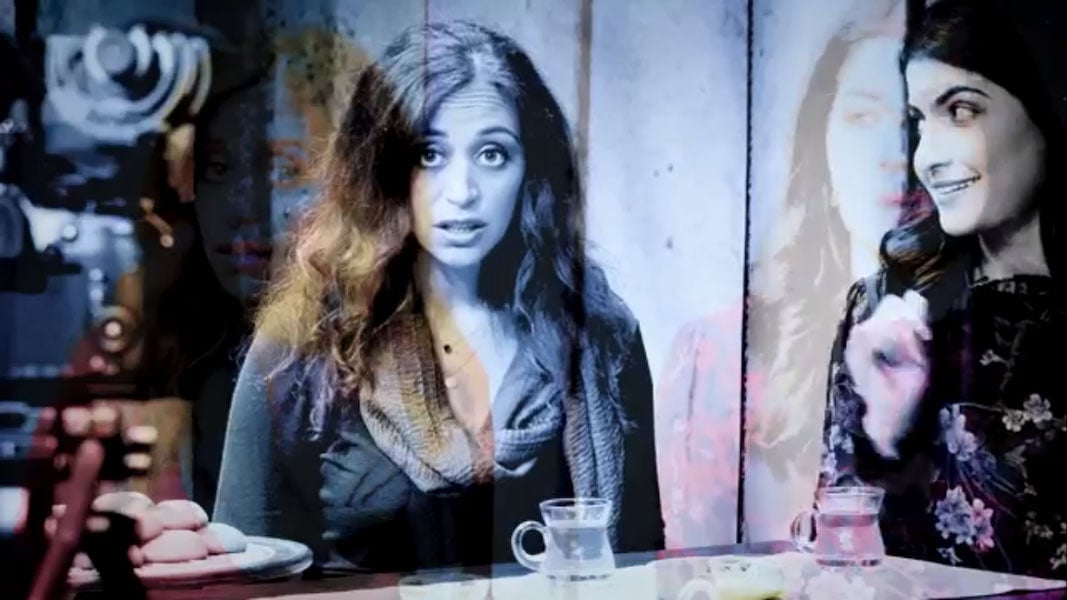
Dalia Taha employs her staccato style of writing to great effect in “The Camera Doesn’t Love Anyone,” the third episode of Keffiyeh: Made in China. Half sentences and poetic repetition drive her messages home with precision and force as two women sit self-consciously facing a camera, discussing a violent murder. The victim was the husband of a third, unseen woman. They were in love; he buys her sweets daily as evidence of his devotion.
Time after time, survivors face similar cameras, describing horrific killings with poise, dignity, and modulated voices. Their stories are translated and disseminated worldwide. With each telling, facts are added and omitted, but the relentless effects of deadly force are omnipresent, forcing Palestinian people to experience, over and over, the grisly details of their loved ones’ sudden demise.
Dina Soltan once again offers a stellar performance, her face a perfect roadmap of roiling emotions. Her languid yet spot-on delivery creates a physical and aural window through which we glimpse lives that are constantly endangered. Sanam Laila Hashemi is equally forceful as the second woman, who parries with Soltan on-camera as she recalls the horrors of death and dismemberment that have become so routine.
Together, the first three episodes of Keffiyeh: Made in China are spinning an indelible web, drawing us further and further into lives under constant occupation.
Running Time: 12 minutes
Episode 4: “Business”
Released June 22, 2021
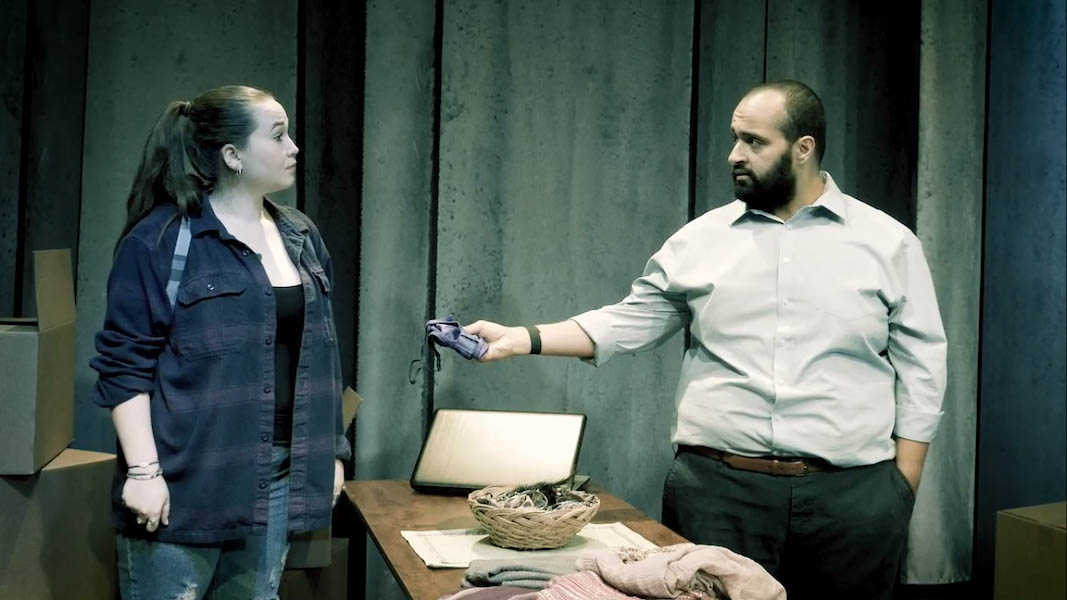
Dalia Taha’s unique talent for addressing global issues in short, pungent two-person dialogues is once again on display in the fourth installment of her play cycle now streaming through the Mosaic Theater Company website. This time, we learn why she titled the whole series Keffiyeh/Made in China. A young Belgian woman walks into a Palestinian shop looking for a keffiyeh for a friend. The young proprietor dodges and weaves, offering instead lessons on economics and politics.
Most keffiyehs, we learn, are no longer made locally. In fact, there is only one secret factory left. The distinctive scarves, once worn as a symbol of Palestinian pride, are now made mostly in China and have been appropriated by fashionistas worldwide. He offers her instead a blue bra.
A vast sea of cultural ignorance separates the two characters. He can’t remember for more than two seconds that she is Belgian, not French or German. They are all the same to him. She takes the offer of a blue bra as thinly veiled porn, recalling warnings about Arab men who take advantage of women traveling alone. When he tries to explain the bra’s significance, she recoils and declares herself uninterested in politics.
In fact, the blue bra was a newer symbol of defiance, recalling a young woman who protested in Cairo’s Tahrir Square 10 years ago. As she was dragged and beaten by police, her abaya was ripped open, revealing in an iconic photo and a viral Youtube video the type of undergarment that this young shop owner was selling in droves.
Ahmad Kamal and Violet Regan play smartly against each other in this short, evocative play. Once again, Taha reminds us how ongoing political and economic strife in the Middle East inflects even the smallest quotidian encounters.
Running Time: 10 minutes
Episode 5: “The Unhappy Writer”
Released July 6, 2021
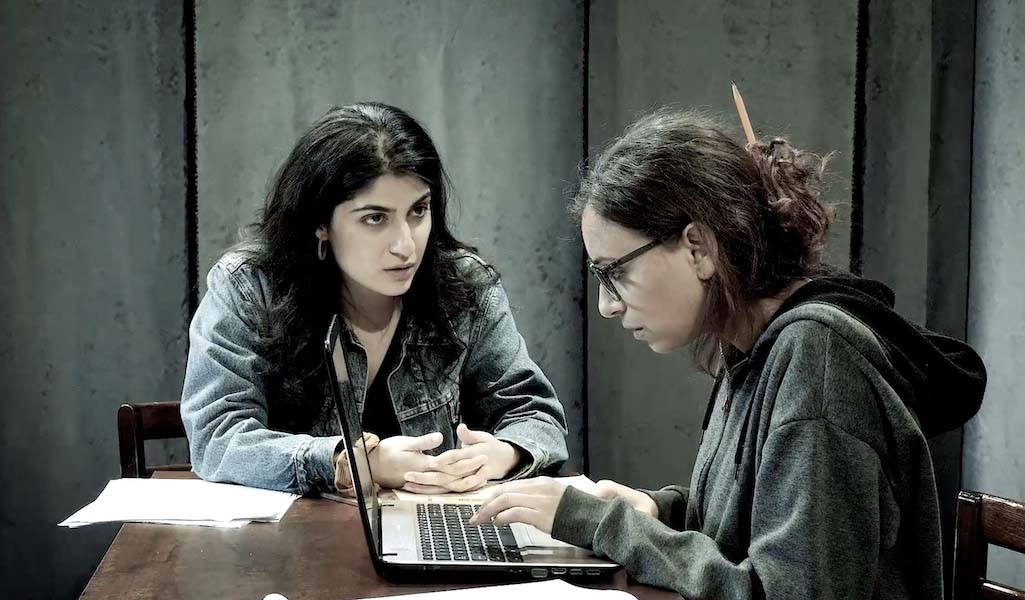
What pair of sisters has not on occasion spiced their relationship with seething jealousy and crafty manipulation? In Dalia Taha’s fifth episode of Keffiyeh/Made in China, a struggling Palestinian writer, now at least temporarily in America, wrestles with a rewrite of her novel, while her visiting sister does everything possible to distract her. Intoxicated with America’s consumer culture, and clearly annoyed by her sibling’s uber-intellectual pursuits, the visiting sister pokes the writer where it will have the most impact. Not only does she chide the other for her hermitlike existence; she also claims to be a writer herself — with lots of published work to her credit.
While this episode speaks much less overtly to the Palestinian situation, it does provide a window into the stresses inherent in their existence and the ways in which each sister copes. One, a natural introvert, aims doggedly for literary success. The other, an unabashed extrovert, uses her street smarts to effect an end run.
It is well worth witnessing Dina Soltan and Sanam Laila Hashemi spar expertly as the sisters. Watch them trade a pair of eyeglasses back and forth, stand, sit, and hunker down in front of a computer as each seeks a kind of dominance over the other. Mother always liked you best.
Running Time: 10 minutes
Episode 6: “Crowdedness”
Released July 20, 2021
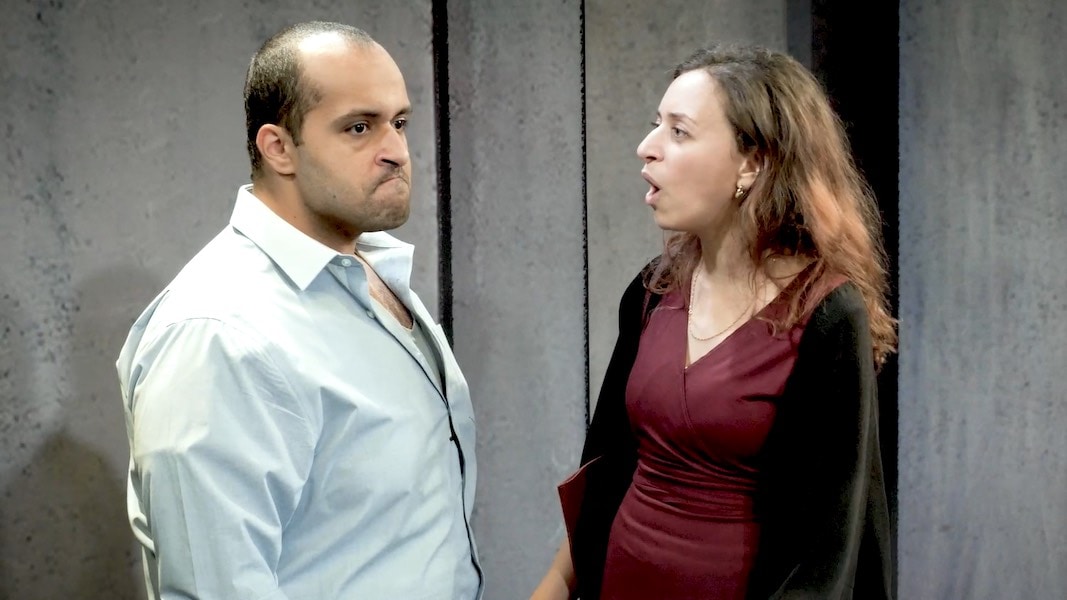
The first year of any marriage is bound to encounter bumps. But when it plays out amidst the tensions experienced by an occupied people, everyday frustrations take on a more urgent tone.
In the space of a remarkably short 8.5 minutes, Dalia Taha’s “Crowdedness” deftly sketches the stress points that emerge between a young Palestinian husband and his new wife (beautifully acted by Ahmad Kamal and Dina Soltan) while they stand in line at a border checkpoint, waiting to be let through. He has an important meeting on the other side and impatiently eyes the crowd — alert to a crafty older woman trying to jump the line. His wife, convinced that he will be strip searched, playfully asks him which boxer shorts he is wearing.
The conversation ramps up quickly into much bigger questions about the couple’s future. We begin to wonder how often any of us stops to listen. What do we do with the information once we have truly heard our partners? These are challenges we all face. But when permeated by the countless humiliations experienced by a subjugated population on a daily basis, each escalation becomes an existential threat. Taha’s conclusion to this brief and provocative drama is both eloquent and achingly sad.
Running time: 8.5 minutes
Episode 7: “Redecoration”
Released August 2, 2021
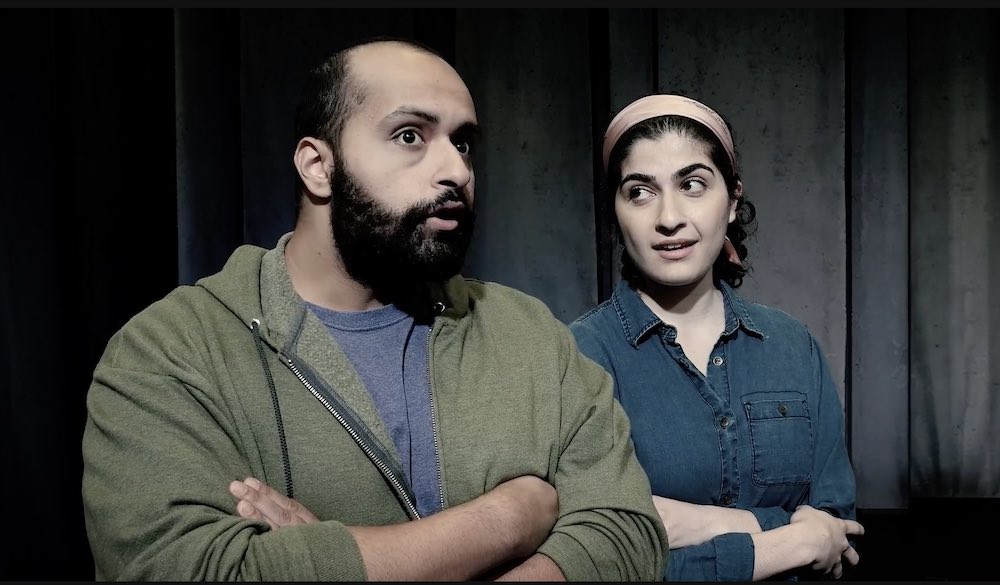
In the seventh and final episode of ‘Keffiyeh/Made in China,’ Ahmad Kamal and Sanam Laila Hashemi as a married couple in an empty room that may or may not be their son’s. DCMTA screenshot.
In the concluding episode of Keffiyeh/Made in China, Dalia Taha returns to a theme that she explored in Episode 2 (“Craving Mangoes”) — the loss of a son. However, this time it’s unclear whether the boy ever existed.
A couple (well played by Ahmad Kamal and Sanam Laila Hashemi) bustle about in an empty room, planning to redecorate. The window leaks, paint is peeling, and the overhead fixture is broken. The room is darkened by the shadow of an additional floor built recently by their neighbors. The couple talk excitedly about adding a lamp, a bedside table, curtains and shelves to the room. She has already purchased phosphorescent stars that can light up the ceiling at night. But the couple make repeated references to graves. Has the child died or does he simply speak to the couple’s desire for a family in the near future? Perhaps both.
Like the other short episodes that comprise Taha’s drama, “Redecoration” consists of a clipped conversation between two family members. Short phrases, unfinished sentences, and questions that hang in mid-air nonetheless build steadily in urgency and meaning. There is an escalating desperation in their exchange.
In choosing to offer Keffiyeh/Made in China, Mosaic Theater has gifted us just that — a mosaic of short and trenchant pinhole theatrical views into the everyday tensions, fears, and losses experienced by the Palestinian people. Director Adam M. Kassim and production designer Mona Kasra have effectively used the web to deliver intense experiences. Kassim directs his players (most of whom appear in more than one episode) with obvious passion tempered by restraint. Kasra’s smart, stripped-down settings reduce our visual cues to their essence, retaining everything that is necessary to move these short stories forward briskly. While we all hope to return full-time to theaters worldwide, Mosaic’s successful online effort reminds us that we don’t have to sacrifice connectedness and artistic excellence even in these challenging times.
Running Time: 11 minutes
Keffiyeh: Made in China, originally distributed as seven short, individual episodes, has been re-released as a single 75-minute virtual production. This video on demand offering is available for purchase and viewing via Mosaic’s website through October 31, 2021. As part of Mosaic’s commitment to providing greater accessibility, this video is also available at no cost by using code: KEFFIYEHZERO during the check-out process.
SEE ALSO:
Mosaic picks six culturally eclectic plays to light up Atlas stage again
Mosaic suspends season opener as not COVID safe





